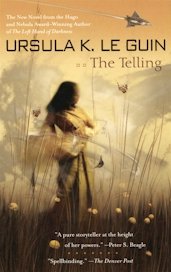 Over the next few weeks, Mythgard is running a free online course on Ursula Le Guin’s The Dispossessed. I’m rereading Le Guin’s Hainish books in order to prepare. The Telling is the most recent book in the series, published in 2000.
Over the next few weeks, Mythgard is running a free online course on Ursula Le Guin’s The Dispossessed. I’m rereading Le Guin’s Hainish books in order to prepare. The Telling is the most recent book in the series, published in 2000.
In some ways, The Telling is a synthesis of Le Guin’s previous Hainish novels. It combines the political skepticism of The Dispossessed, the anti-imperialism of The Word for World is Forest, and the intimacy of The Left Hand of Darkness. Yet, Le Guin never simply rehashes previous work. The Telling has its own identity as an exploration of how cultures survive government attempts to homogenize them. Continue reading ““The Telling” by Ursula K. Le Guin”



